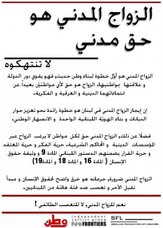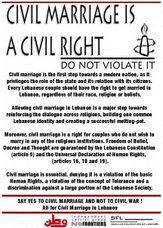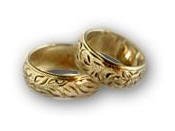
Carla and Wissam
Carla and Wissam met some seven years ago during a training course. He thought she was arrogant, she did not notice him at the time.Yet, in a little more than a year, they had a modern romance. Recently, they decided to get married.Wissam is a 29-year old Sunni Muslim and Carla is a 29-year Greek Orthodox Christian. He did not want to tie the knot in a church and she did not want to meet a Sheikh. They were left with only one option: a civil marriage in Cyprus.They were both fine with this alternative, as it would preserve the rights of both in maintaining their beliefs and would not offend their families. The process was really easy. They were partly familiar with it as a few of their friends did it. The website of the Cypriot authorities also facilitated the process.They took an appointment via email with the civil marriage officer who explained every detail. The time needed to contract the marriage is one day. A second day might be needed to ensure all steps are completed. They took the appointment for a “marriage by special notice”, which is a formula tailored for foreigners who need to marry in a short period. The fee for the marriage by special notice is 165 Cypriot pounds, the equivalent of about $ 310.“Our appointment at the Nicosia Municipality was on Friday June 13 at 10 am. Perhaps it was a good luck sign,” said Carla.“In shorts and sandals, we were at the municipality on time and met with the officer who ensured we had the proper documents and took some information to prepare our file,” added Wissam.The officer was quite familiar with Lebanese people, since many of them come to Nicosia to have a civil marriage. All the Cypriot municipalities are prepared to receive marriage applications for foreigners and provide the needed information on their websites. Civil marriage in Cyprus was introduced in 1923.“In half an hour, we went to the Judge, a very old lady wearing glaring red and a big silver medal,” the couple explained. “We stood in front of her and I put my hand on the Bible while Wissam put his hand on the Koran swearing that we know of no hindrance to our marriage and will abide by the Cypriot civil marriage laws”, said Carla.Then, on the tunes of soft music, each one of them pronounced life-lasting love vows, by which the judge married them. They signed the marriage certificate along with two witnesses.They stamped the marriage certificate at the Cypriot Ministry of Foreign Affairs. Then they sent it to the Lebanese Embassy in Nicosia also for stamping and later sending it to Lebanon’s Ministry of Foreign Affairs that registers the marriage in Lebanon.This last stage is important to make sure that in Lebanon the law regards them as a married couple.“The civil marriage experience exceeded our expectations,” expressed the happy couple as they “enjoyed every minute of it particularly the easy and simple but also very intimate process and the vows that were an exact translation of our feelings”.The civil marriage was the only neutral way to legalize their relationship in a country, where interfaith marriages are not performed, and living together outside marriage is still a taboo.
--------------------------------------------------------------
Zeina and Faris
They had a modern romance. They met at the office, exchanged jokes via e-mail, and went to see movies in French, Arabic and English. She thought he read too much. He thought she wore too much make-up.
But when they finally decided to wed, he agnostic, she Muslim, Faris Sayegh, 36, and Zena Jisr, 29, were forced to marry in Cyprus because marriage outside of a church or mosque does not exist in Lebanon.
"I personally have two problems with a religious wedding," said Sayegh, a geographical information systems consultant who comes from a Protestant family. "No.1, I don't believe in it. No.2, whatever you do, whether you choose a church or a mosque, you will offend the other side."
Jisr, for her part, was "very happy the way I got married."A former industrial spy who is now an executive assistant in an investment company, Jisr describes herself as a "modern" woman who wants to be treated as an equal to her husband. She views civil marriage as a part of that equality.
"I think in the Muslim way, women really don't have any rights in marriage," she said.
The couple opted for a civil ceremony because it is the only neutral way to legalize their relationship in a country where living together outside marriage is still taboo.
They are among the fortunates ones, able to fly to Cyprus, the most popular civil marriage destination for Lebanese. The couple was followed on the short flight over the Mediterranean by 15 friends and relatives who attended the secular wedding in June.
While the democratic republic of Lebanon is arguably the most westernized and diverse of the Arab countries, with 18 religious communities coexisting after a 17-year civil war, it is also a country, like neighboring Israel that recognizes only civil marriages performed outside its borders.
It is a restriction that underscores the power of religious authorities over even the most intimate aspects of daily life in this majority Muslim state.
The balance of religious power in Lebanon is maintained by a carefully selected triumvirate: a Maronite Christian president, Sunni Muslim prime minister and Shiite Muslim speaker of the National Assembly. Although many Lebanese would prefer not to state whether they belong to a church or a mosque, citizens' religious affiliation is clearly stamped on every identity card and most are still governed by the law of their religion.
But even though secular ideas increasingly are running up against the power of traditional religious belief, it will be a long while before civil marriages are performed in Lebanon, observers say.
When former president Elias Hrawi tried last year to enact an optional civil marriage law, the project was shelved. "The government had to back up because the topic was too hot and at a time of political and economic instability, they feared an explosion of violence, especially among Muslims," said Pierre Ganage, a professor of Interdenominational law at the Jesuit Saint-Joseph University.
Because a couple cannot marry under both religions, one religious authority always will control the affairs of the marriage, Ganage said. And religious leaders on all sides are reluctant to accept civil marriage because they fear losing their powerful influence on Lebanese society, he added.
"Even though the government was willing to push forward civil marriage for the simple reason that government officials did not want to be considered 'reactionary' and 'old-fashioned', their commitment was not strong enough to bypass the power of the religious authorities," Ganage said.
When the civil marriage proposal was first made public 18 months ago, Cardinal Nasrallah Butros Sfeir, leader of the Maronites, the largest Christian group in Lebanon, said that while he did not oppose the proposal, he could not approve of it so long as Muslim religious authorities rejected it.
"The law is either there for all Lebanese or for none," he said. Georges Dimas, a Greek Orthodoc priest at Notre Dame de l'Annonciation in Beirut, said that while "the church is not against civil marriage in itself, since it recognizes freedom of choice, I must admit that it does not make me happy to see young people choosing to get married outside it."
Muslim leaders tend to be the most vocally opposed. "We cannot accept the marriage of a Muslim woman to someone who is not Muslim-this is our most important disagreement with civil marriage," said Sheikh Maher Hammoud, the Sunni leader of a mosque in the Southern coastal town of Sidon. "If the husband is not Muslim, she will take the ideas of her husband, who has the wrong ideas," he said.
Despite the opposition of religious leaders, more and more couples are choosing a civil wedding abroad. "I have a lot of couples who go to Cyprus to get married, especially in the summer, when I have at least one a week," said Hassan Ismail from the Sogetour travel agency, which offers packages starting at $500 three-day wedding packages to Cyprus."Now, it is à la mode to do a civil marriage," said Ismail adding that the number of couples marrying in Cyprus has doubled in the past year.
Although the majority of Lebanese still oppose civil marriage, attitudes vary by religion. In a 1998 survey, 29 percent of the Lebanese favored it, while 69 percent were opposed. Christians support it most --Greek Orthodox were the largest group in favor, with 61 percent, followed by Maronites at 56 percent-- but only 17 percent of Shiites and 10 percent of Sunnis approved, in a country where Muslims make up nearly 70 percent of the population.
"Many people are for the civil marriage in theory but against it in practice," said Paul Salem, 38, executive director of the Lebanese Center for Policy Studies.
Salem, a strong proponent of civil marriage, does not hide his views. "Two people from the same country should be able to get married in this day and age, regardless of their religion," he said.
Zena Jisr and Faris Sayegh hope that their marriage is a sign of a move towards a more secular Lebanon. Perhaps one day, they say, their children will be free to choose - "or not to choose," Sayegh says-- their own religion.
"My mom jokes that things are going great in Lebanon when the grandson of a Protestant pastor can marry the granddaughter of a Sheikh," Jisr said with a laugh.
But when they finally decided to wed, he agnostic, she Muslim, Faris Sayegh, 36, and Zena Jisr, 29, were forced to marry in Cyprus because marriage outside of a church or mosque does not exist in Lebanon.
"I personally have two problems with a religious wedding," said Sayegh, a geographical information systems consultant who comes from a Protestant family. "No.1, I don't believe in it. No.2, whatever you do, whether you choose a church or a mosque, you will offend the other side."
Jisr, for her part, was "very happy the way I got married."A former industrial spy who is now an executive assistant in an investment company, Jisr describes herself as a "modern" woman who wants to be treated as an equal to her husband. She views civil marriage as a part of that equality.
"I think in the Muslim way, women really don't have any rights in marriage," she said.
The couple opted for a civil ceremony because it is the only neutral way to legalize their relationship in a country where living together outside marriage is still taboo.
They are among the fortunates ones, able to fly to Cyprus, the most popular civil marriage destination for Lebanese. The couple was followed on the short flight over the Mediterranean by 15 friends and relatives who attended the secular wedding in June.
While the democratic republic of Lebanon is arguably the most westernized and diverse of the Arab countries, with 18 religious communities coexisting after a 17-year civil war, it is also a country, like neighboring Israel that recognizes only civil marriages performed outside its borders.
It is a restriction that underscores the power of religious authorities over even the most intimate aspects of daily life in this majority Muslim state.
The balance of religious power in Lebanon is maintained by a carefully selected triumvirate: a Maronite Christian president, Sunni Muslim prime minister and Shiite Muslim speaker of the National Assembly. Although many Lebanese would prefer not to state whether they belong to a church or a mosque, citizens' religious affiliation is clearly stamped on every identity card and most are still governed by the law of their religion.
But even though secular ideas increasingly are running up against the power of traditional religious belief, it will be a long while before civil marriages are performed in Lebanon, observers say.
When former president Elias Hrawi tried last year to enact an optional civil marriage law, the project was shelved. "The government had to back up because the topic was too hot and at a time of political and economic instability, they feared an explosion of violence, especially among Muslims," said Pierre Ganage, a professor of Interdenominational law at the Jesuit Saint-Joseph University.
Because a couple cannot marry under both religions, one religious authority always will control the affairs of the marriage, Ganage said. And religious leaders on all sides are reluctant to accept civil marriage because they fear losing their powerful influence on Lebanese society, he added.
"Even though the government was willing to push forward civil marriage for the simple reason that government officials did not want to be considered 'reactionary' and 'old-fashioned', their commitment was not strong enough to bypass the power of the religious authorities," Ganage said.
When the civil marriage proposal was first made public 18 months ago, Cardinal Nasrallah Butros Sfeir, leader of the Maronites, the largest Christian group in Lebanon, said that while he did not oppose the proposal, he could not approve of it so long as Muslim religious authorities rejected it.
"The law is either there for all Lebanese or for none," he said. Georges Dimas, a Greek Orthodoc priest at Notre Dame de l'Annonciation in Beirut, said that while "the church is not against civil marriage in itself, since it recognizes freedom of choice, I must admit that it does not make me happy to see young people choosing to get married outside it."
Muslim leaders tend to be the most vocally opposed. "We cannot accept the marriage of a Muslim woman to someone who is not Muslim-this is our most important disagreement with civil marriage," said Sheikh Maher Hammoud, the Sunni leader of a mosque in the Southern coastal town of Sidon. "If the husband is not Muslim, she will take the ideas of her husband, who has the wrong ideas," he said.
Despite the opposition of religious leaders, more and more couples are choosing a civil wedding abroad. "I have a lot of couples who go to Cyprus to get married, especially in the summer, when I have at least one a week," said Hassan Ismail from the Sogetour travel agency, which offers packages starting at $500 three-day wedding packages to Cyprus."Now, it is à la mode to do a civil marriage," said Ismail adding that the number of couples marrying in Cyprus has doubled in the past year.
Although the majority of Lebanese still oppose civil marriage, attitudes vary by religion. In a 1998 survey, 29 percent of the Lebanese favored it, while 69 percent were opposed. Christians support it most --Greek Orthodox were the largest group in favor, with 61 percent, followed by Maronites at 56 percent-- but only 17 percent of Shiites and 10 percent of Sunnis approved, in a country where Muslims make up nearly 70 percent of the population.
"Many people are for the civil marriage in theory but against it in practice," said Paul Salem, 38, executive director of the Lebanese Center for Policy Studies.
Salem, a strong proponent of civil marriage, does not hide his views. "Two people from the same country should be able to get married in this day and age, regardless of their religion," he said.
Zena Jisr and Faris Sayegh hope that their marriage is a sign of a move towards a more secular Lebanon. Perhaps one day, they say, their children will be free to choose - "or not to choose," Sayegh says-- their own religion.
"My mom jokes that things are going great in Lebanon when the grandson of a Protestant pastor can marry the granddaughter of a Sheikh," Jisr said with a laugh.




1 comment:
First of all I want to say superb blog! I had a quick question in which I'd like to ask if you do not mind.
I was interested to find out how you center yourself and clear your mind before writing.
I have had trouble clearing my mind in getting my ideas out.
I do enjoy writing however it just seems like the first 10 to 15 minutes are
wasted just trying to figure out how to begin. Any ideas or hints?
Thanks!
Also visit my webpage
Post a Comment